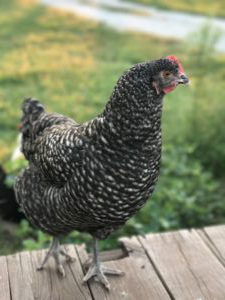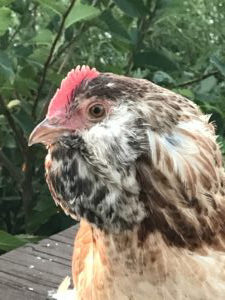



Chickens are amazing creatures! I have had people come up to me at the grocery store and ask if I was the “Chicken Lady.” They are always curious to why I started keeping chickens in the suburbs of Kansas City. Since it’s one of my favorite subjects, I have no problem sharing. Below are seven facts I have learned about chickens.
1. You can research, read, and educate yourself as much as possible. I encourage you to do this, but until you spend time with chickens and watch them yourself, you just don’t know what you’re getting into. Are you thinking “what is this lady talking about?” Let me explain. When my husband suggested we get chickens, I immediately shot the idea down. I told him we were not having those dirty, smelly things in our backyard. Plus, we live in the burbs and clotheslines were not legal. What made him think that we would be allowed to get chickens! We finally agreed to get 4 chicks. We ended up getting 6, 2 more than my husband wanted. They were so cute, and I had read about different breeds, so it was hard for me to walk away with only 6. Luckily it was a wonderful decision for us, and five years later I am writing a chicken blog and have 50 chickens. Not everyone loves chickens as much as I do, so if you have a way of spending time with chickens before you get them you should. They are lots of fun, but they also come with lots of work, and time.
2. Breed descriptions can tell you a lot about a chicken. I love reading about the breeds history, egg production, and egg color. But, when it comes to chicken temperament, they can be wrong. Crested Polish are usually the girls on the farm that get picked on. Maybe it’s jealousy from the other girls because they don’t have lovely, poofy feathers themselves, maybe it’s curiosity wondering if they are even chickens. I had a one named Poppy, and she was such a bully. We kept her separated from another Polish, not for their protection but because she enjoyed causing chaos.
3. We have all heard a chicken attack story or two. Chickens are far from the bird brain stereotypes. They can remember 100 faces. So, if you cross them, they will remember it. LOL! They recognize their owners, family dogs, and other animals. If a stranger comes into our property human or four-legged, you will know.
4. Chickens make close to 30 sounds. Spend enough time with them, and you will get to know what each one sounds like and mean. For example, the stranger or threat in the yard loud, loud repeated cry or squawk. My absolute favorite sound is a chicken purring. Yes, chickens purr. To my ears, it’s better than hearing a cat purr. A sign that they are happy, safe, and content.
5. Dust Bathing, I am sure I had read about dust bathing before we got chickens. I guess it didn’t click, because one day when I looked out my window and saw my hen shaking, and rolling around. I ran to the computer and googled “chicken seizures.” I was terrified. I never expected that. They puff their feathers out and scratch the dirt. Thinking back on that day it makes me giggle.
6. There are no two chickens the same. They have free will and personalities all their own. When I first started chicken keeping, I went out and bought play sand, DE, and a baby pool and made the girls the cutest dust bathing area. Where do they dust bath? In an old flower box. Just like kids, some of our girls like vegetables and some don’t, some are more affectionate than others. One thing is for sure they are who they are.
7. Chickens are curious, and they peck, so wear glasses even if you don’t wear them to see, buy safety glasses and wear them. You can’t be upset with a chicken who pecks your toes when you have nail polish on. I have had chickens peck my teeth while I was holding her. They see something shiny or different and think “what is that?” This is how chickens communicate. They don’t speak the same language as we do, they don’t have hands, so pecking is one way they communicate.
Before I go, let me share this fun fact with you. What town has a population of 7 and the best name ever? Chicken, Alaska!













1 Comment
I have a chicken run at 2 ft/chicken. I live in a rural community and that is the city guidelines, I what then the consider a larger outdoor run. What would be the points I would use in order to change their mind?